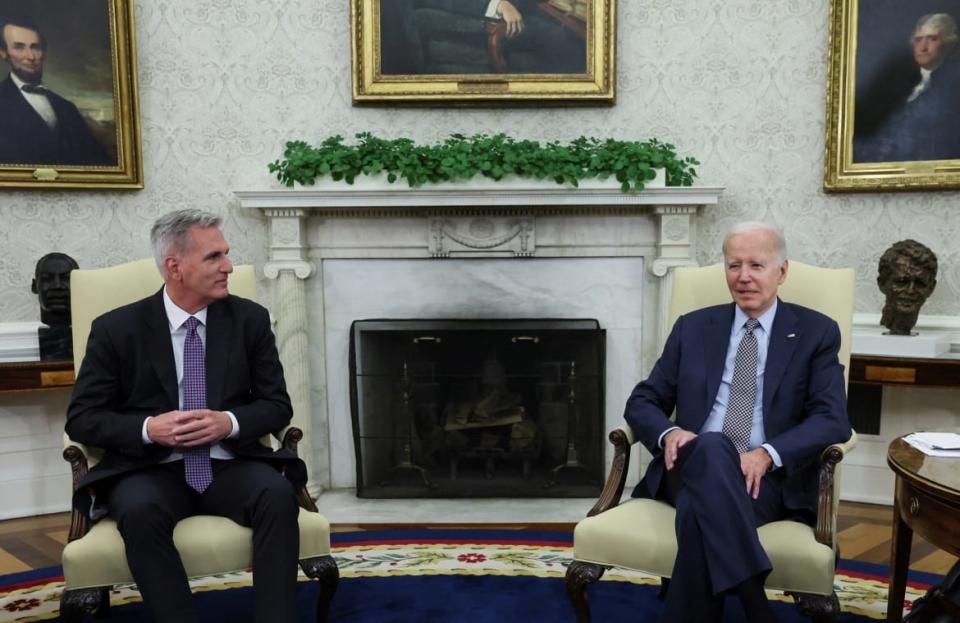How a Boston Lawsuit Could Get Us Out of the Debt Ceiling Mess

It’s so crazy, it just might work. Or perhaps it isn’t crazy at all.
With less than two weeks to go before the federal government exhausts its borrowing authority under the debt limit, and no exhaustion at all to the Republican Party’s desire to hold the world economy hostage, some observers are predicting an unprecedented default.
But not so fast. An ingenious lawsuit developed by lawyers for the National Association of Government Employees (NAGE) not only could provide a way out, but could do so on the sort of impeccable conservative terms that the current Supreme Court might not be able to resist.
AG Merrick Garland Needs to Get Out of the Business of Defending Trump
NAGE’s lawsuit, the brainchild of the brilliant labor lawyer Thomas Geoghegan, is pretty straightforward:
1) Congress has passed a whole bunch of spending bills;
2) Congress has also passed the debt ceiling;
3) In order for the president to adhere to both spending and the debt ceiling, he must decide which spending to move forward with, and which spending to impound.
4) This kind of decision means that the Executive has the spending power, because the president is making spending decisions.
5) Article I of the Constitution gives that power to Congress, and thus the debt ceiling is unconstitutional.
(If you are wondering about standing, NAGE’s argument is straightforward: adhering to the debt ceiling “requires a reduction of operations of government approved by Congress,” and thus could lay off or furlough public employees. Such layoffs and furloughs would, in fact, injure NAGE’s members, which are causes by adherence to the debt ceiling, and declaring the ceiling unconstitutional could redress the harm.)
Why should this litigation succeed? First, there is a case right on point: Clinton v. New York (1998), which held the line-item veto unconstitutional. The Supreme Court held (6-3, with Justice John Paul Stevens writing the opinion, which was joined by Justice Clarence Thomas, among others) that if Congress decides to spend money, the president cannot choose to refuse to spend it unless Congress gives him new authority overturning specific spending.
Elon Musk, Joe Rogan, and the Apocalyptic ‘Centrists’
The logic is exactly the same here, argue the NAGE plaintiffs: by passing appropriations, and then the debt ceiling, Congress is essentially granting the president the authority to decide which duly-enacted appropriations to spend and which to ignore.
That is the line-item veto, and it has already been ruled unconstitutional. Indeed, it is even stronger than that: if, as in Clinton, Congress could not explicitly grant the president such authority, there is even less reason to believe that it can implicitly do so.

Bill Clinton speaks at a fundraiser in New York October 25, 2000.
That is strong in and of itself. But, as the late-night television ads used to say: Wait! There’s more!
Federalist Society founder Steven Calabresi called Clinton a “nondelegation case masquerading as a bicameralism and presentment case.” His reasoning was straightforward: by passing the line-item veto act, Congress had specifically delegated to the President the right to make certain spending choices, and the Court said that that sort of delegation was unconstitutional.
This is precisely the logic underlying the Major Questions Doctrine, one of the Roberts Court’s most significant doctrinal innovations. That doctrine says that Congress cannot delegate large policy questions to the president; the chances are very good that the Court will use this doctrine to strike down the Biden administration’s climate change regulations. The Court’s current definition of a “Major Question” is “a policy that the six of us don’t like,” but for now that is neither here nor there.
Why All 9 Supreme Court Justices United to Avoid Accountability
Well, compared to the intricately detailed Clean Air Act—a statute that runs for literally hundreds of pages, with detailed guidance as to how the EPA should ensure air quality, the debt ceiling together with appropriations and other spending laws lacks content altogether.
Compare the debt ceiling to the Clean Air Act, which the Supreme Court has in its sights as delegating too much discretion to the president. That Act runs to literally hundreds of pages and contains detailed guidance about how the EPA should ensure air quality. By contrast, the appropriations and other spending plus the debt ceiling gives no guidance whatsoever: it essentially just says, "do all this, and if there isn't enough money, then choose for yourself."
It thus gives the president completely untrammeled discretion to make policy choices. It provides no standards, or priorities, or values, or anything else.
Put another way, if the debt ceiling does not violate the Major Questions Doctrine, then nothing violates the Major Questions Doctrine. Given the right-wing majority’s ideological commitment to its new doctrinal invention, it stands to reason that it will want to put flesh on its bones, and will jump at the chance to do so. NAGE’s lawsuit, in other words, strokes the justices at the most sensitive places in their doctrinal erogenous zones.
Note also that because the debt ceiling is so extreme in the discretion it offers the Executive, at least as a matter of doctrine it should not endanger most regulatory statutes. One can easily uphold the Clean Air Act’s provisions while invalidating the debt ceiling; but one cannot do the opposite, at least if one wants to act with intellectual honesty.
This last point does highlight the major weakness of the NAGE lawsuit. This Court has made intellectual dishonesty into something close to an art form. So maybe arguments don’t matter; it’s all power and ideology now.
But that actually provides something of a strength, as well.
John Durham Owes the American People an Apology for Wasting Their Money
Blowing up the world economy might satisfy Speaker Kevin McCarthy, Rep. Marjorie Taylor Greene, and Newsmax, but it will hardly Republican billionaires. Senate Minority Leader Mitch McConnell’s contributors do not want a default. Neither does Harlan Crow.

Joe Biden hosts debt limit talks with Kevin McCarthy in the Oval Office at the White House in Washington, DC on May 22, 2023.
If saving Republican contributors isn’t good enough for the Court, maybe reinforcing their new doctrinal toy will.
Right now, NAGE v. Yellen sits on the docket of U.S. District Judge Robert Stearns, a Clinton appointee with a reputation as a sober, professional jurist. NAGE has asked for injunctive relief before the Federal government hits the debt ceiling, so it is possible that we will get a ruling within a few days.
If Stearns follows the law, he will rule the debt ceiling unconstitutional under Clinton and the Major Questions Doctrine. And in this case, the defendant—the Treasury Department itself—should not resist the temptation to offer only a token defense.
Get the Daily Beast's biggest scoops and scandals delivered right to your inbox. Sign up now.
Stay informed and gain unlimited access to the Daily Beast's unmatched reporting. Subscribe now.

